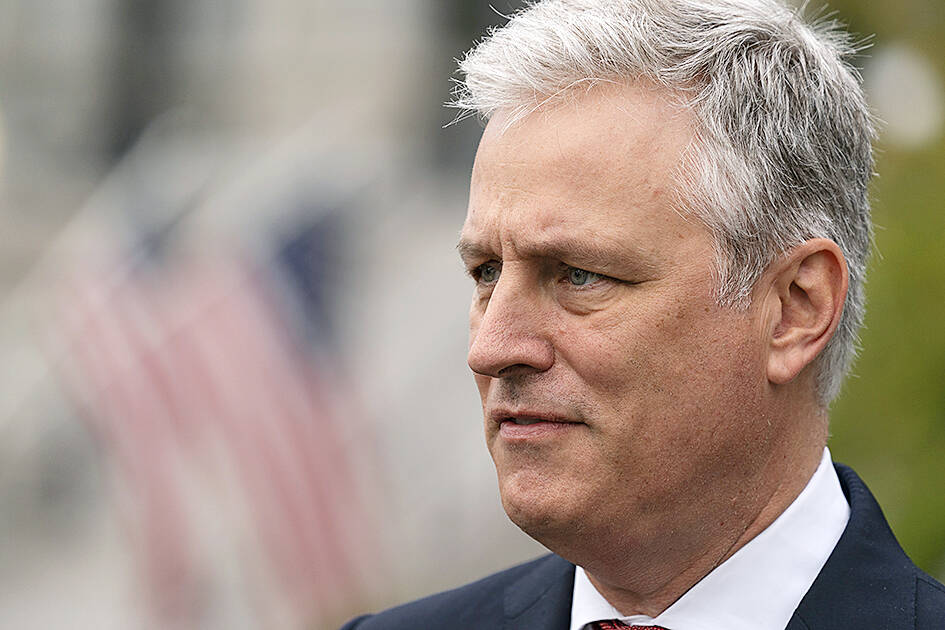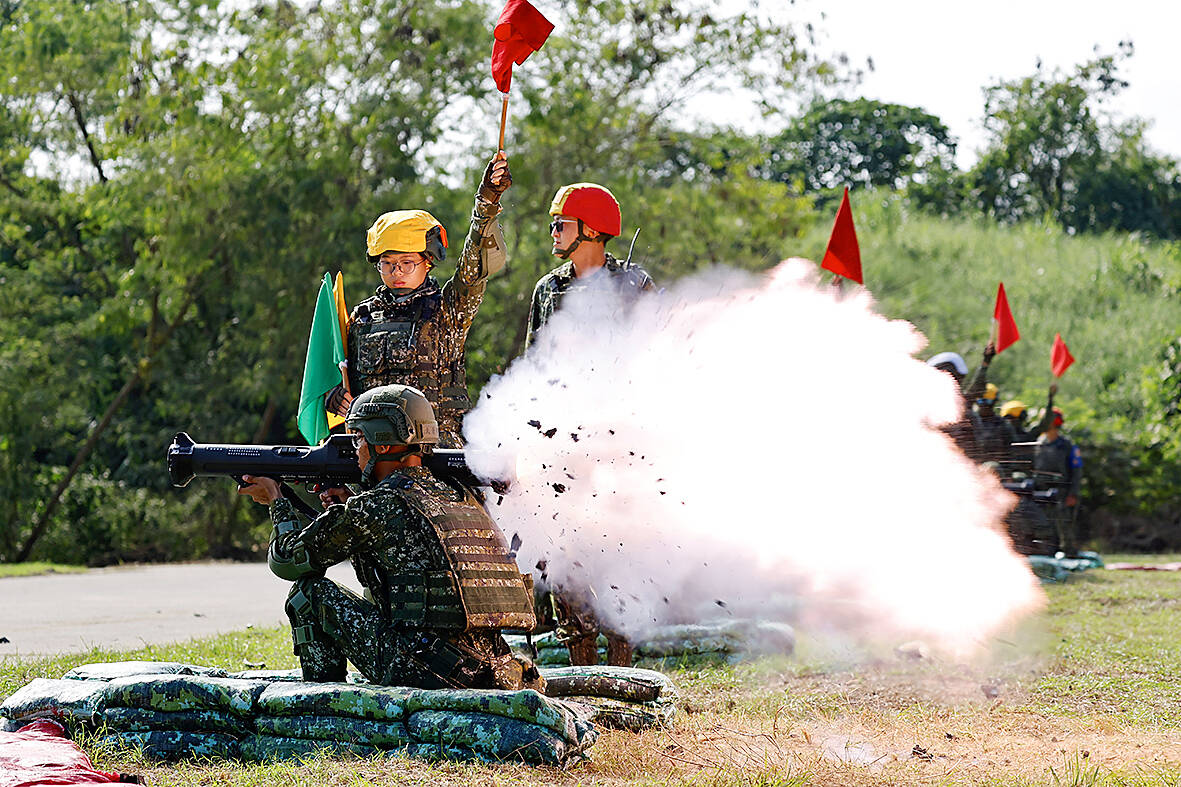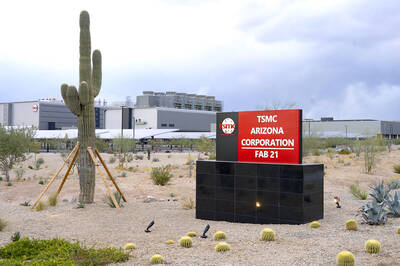While Americans face the upcoming second Donald Trump presidency with bright optimism/existential dread in Taiwan there are also varying opinions on what the impact will be here.
Regardless of what one thinks of Trump personally and his first administration, US-Taiwan relations blossomed. Relative to the previous Obama administration, arms sales rocketed from US$14 billion during Obama’s eight years to US$18 billion in four years under Trump.
High-profile visits by administration officials, bipartisan Congressional delegations, more and higher-level government-to-government direct contacts were all increased under Trump, setting the stage and example for the Biden administration to follow. However, Trump administration secretary of state Mike Pompeo’s late move to lift all self-imposed restrictions on official contact between his department and Taiwanese officials was partially reversed under Biden.

Photo: Liao Chen-huei, Taipei Times
While the Trump administration was strikingly more supportive of Taiwan than any since perhaps as far back as Dwight D. Eisenhower, it was uneven and came in two varieties, depending on the specific type administration official, who made up their own decisions about Taiwan largely independently of other government agencies. This contrasts with the Biden administration, where all top officials and agencies used almost identical language and a unified, clearly coordinated.
The two distinct types of official that colored their outlook and approach to Taiwan in the first term have already been joined by a third type, with the potential for a fourth to appear.
FIRST TERM TWO VARIETIES

Photo: AP
Many first-term Trump officials came in with an “enemy of my enemy” approach to Taiwan and were supportive of Taiwan in the context of being anti-China. These “anti-China” officials, which notably included figures like trade advisor Peter Navarro and it appears Trump himself, at the time did not appear to be much concerned with the value, economic or moral, of Taiwan in and of itself, only what value it provided the US in their proxy struggle with China.
The other type valued Taiwan and the Taiwanese themselves, viewed supporting and assisting it as a virtue in and of its own right and understood that it brought value not just as a pawn, but to the world generally. Notable “pro-Taiwan” figures included former national security advisors John Bolton and Robert O’Brien, former deputy national security advisers Matt Pottinger and Stephen Yates and, especially, and very eloquently, Pompeo. Bolton has very publicly trashed Trump and it was just announced that Pompeo will not be part of the incoming administration, but the others remain possibilities.
It does not appear that Trump personally got involved much in Taiwan relations, with the notable exception of taking then-president Tsai Ing-wen’s (蔡英文) congratulatory call following his first election victory.

Photo: EPA-EFE
ECOND TERM EMERGING THIRD VARIETY
A third category is emerging, and a fourth could potentially arise. The newly emerging third category is the “what can you do for us” type of official.
This appears to be in response to two sources, Trump’s famed transactionalist approach and an increased awareness of Taiwan’s wealth, key role in supply chains and in semiconductors. Trump has referred to Taiwan several times recently in this light, demanding Taiwan pay “insurance” for military protection, despite the massive amounts of military kit Taiwan buys from the US.
He also claimed that Taiwan “stole” America’s chip industry, when in reality Taiwan Semiconductor Manufacturing Co (TSMC) out-innovated Intel. TSMC’s investment in Arizona is the largest single foreign investment in American history.
There are concerns that Trump might try to reverse the CHIPS act, which provides subsidies to encourage the semiconductor supply chain to move to the US. But this seems unlikely because it is in his interest to bring more higher-end business investment to America. One might recall how excited he was to invite Hon Hai Precision Industry Co founder’s Terry Gou (郭台銘) to the White House after Gou promised to build a big factory in Wisconsin (they are still waiting).
Vice President-elect JD Vance appears to be in this category, wanting to defend Taiwan purely because it is in America’s economic and military interest to do so. The recent call by US deputy assistant secretary of defense for strategy and force development Eldridge Colby for Taiwan to spend at least 10 percent of GDP on the military may have also been similarly motivated.
Broadly speaking, the incoming administration appears to be applying this sort of mentality to not just Taiwan, but across the board. For example, they want to enact over 10 percent tariffs on all imports, investigate countries running large surpluses with the US to determine if they are acting as transit points for Chinese goods and also push countries to inflate their currencies to make American products more competitive.
A POTENTIALLY ALARMING FOURTH VARIETY
While there is no sign yet that a new “what can you do for Trump” type that works to broker deals that benefit the boss personally is emerging. This possibility was recently brought to light by comedian John Oliver.
During the first Trump administration there was a limit to how much foreign governments could use cash to try and influence Trump. They could spend lavishly at his hotels and golf courses, and that was about it — any attempt to buy Trump products en masse would have clearly violated the foreign emoluments clause in the Constitution.
Now, however, he owns a significant amount of stock in Trump Media & Technology Group, which owns Truth Social. While the price is volatile, Trump’s stock holdings in the company were worth about US$3.5 billion based on the Nov. 1 closing price.
Because it is a freely traded stock, it could be bought by foreign governments, increasing the value of the stock and thereby increasing Trump’s personal wealth along with it by large amounts, possibly in the hundreds of millions or even billions of US dollars. Could this potentially influence Trump and the Trump administration if ordered to take specific actions?
Trump has also launched the cryptocurrency platform World Liberty Financial, which last month launched its own native token. That is a stablecoin pegged to the US dollar, so in theory the value is fixed, but they could create a freely traded cryptocurrency in the future that would also allow foreign governments to also influence the price.
Trump putting his holdings in a trust would do little to stop this practice, he would still be aware of the value of the stock. The question becomes, is buying freely traded stock or cryptocurrency on an open market a violation of the foreign emoluments clause? How confident can we be the current Supreme Court would rule fairly even if it is a violation?
In Bolton’s memoir he described Trump likening Taiwan to the tip of a Sharpie and China to the Resolute Desk, suggesting he viewed Taiwan as small and unimportant compared to the much bigger China. How accurate that characterization is of his attitude overall towards Taiwan is hard to say, and at one point in an interview seemed to imply that his administration would defend Taiwan.
Money could be just the leverage that the Chinese Communist Party (CCP) is looking for, and they would not have any compunction against using it. Nor the Russians. What would happen if the CCP tried to buy off Trump to back off supporting Taiwan, or the Russians to get the Americans to back off Ukraine, or both?
Donovan’s Deep Dives is a regular column by Courtney Donovan Smith (石東文) who writes in-depth analysis on everything about Taiwan’s political scene and geopolitics. Donovan is also the central Taiwan correspondent at ICRT FM100 Radio News, co-publisher of Compass Magazine, co-founder Taiwan Report (report.tw) and former chair of the Taichung American Chamber of Commerce. Follow him on X: @donovan_smith.

From censoring “poisonous books” to banning “poisonous languages,” the Chinese Nationalist Party (KMT) tried hard to stamp out anything that might conflict with its agenda during its almost 40 years of martial law. To mark 228 Peace Memorial Day, which commemorates the anti-government uprising in 1947, which was violently suppressed, I visited two exhibitions detailing censorship in Taiwan: “Silenced Pages” (禁書時代) at the National 228 Memorial Museum and “Mandarin Monopoly?!” (請說國語) at the National Human Rights Museum. In both cases, the authorities framed their targets as “evils that would threaten social mores, national stability and their anti-communist cause, justifying their actions

Taiwanese chip-making giant Taiwan Semiconductor Manufacturing Co (TSMC) plans to invest a whopping US$100 billion in the US, after US President Donald Trump threatened to slap tariffs on overseas-made chips. TSMC is the world’s biggest maker of the critical technology that has become the lifeblood of the global economy. This week’s announcement takes the total amount TSMC has pledged to invest in the US to US$165 billion, which the company says is the “largest single foreign direct investment in US history.” It follows Trump’s accusations that Taiwan stole the US chip industry and his threats to impose tariffs of up to 100 percent

In the run-up to World War II, Admiral Wilhelm Canaris, head of Abwehr, Nazi Germany’s military intelligence service, began to fear that Hitler would launch a war Germany could not win. Deeply disappointed by the sell-out of the Munich Agreement in 1938, Canaris conducted several clandestine operations that were aimed at getting the UK to wake up, invest in defense and actively support the nations Hitler planned to invade. For example, the “Dutch war scare” of January 1939 saw fake intelligence leaked to the British that suggested that Germany was planning to invade the Netherlands in February and acquire airfields

The launch of DeepSeek-R1 AI by Hangzhou-based High-Flyer and subsequent impact reveals a lot about the state of the People’s Republic of China (PRC) today, both good and bad. It touches on the state of Chinese technology, innovation, intellectual property theft, sanctions busting smuggling, propaganda, geopolitics and as with everything in China, the power politics of the Chinese Communist Party (CCP). PLEASING XI JINPING DeepSeek’s creation is almost certainly no accident. In 2015 CCP Secretary General Xi Jinping (習近平) launched his Made in China 2025 program intended to move China away from low-end manufacturing into an innovative technological powerhouse, with Artificial Intelligence